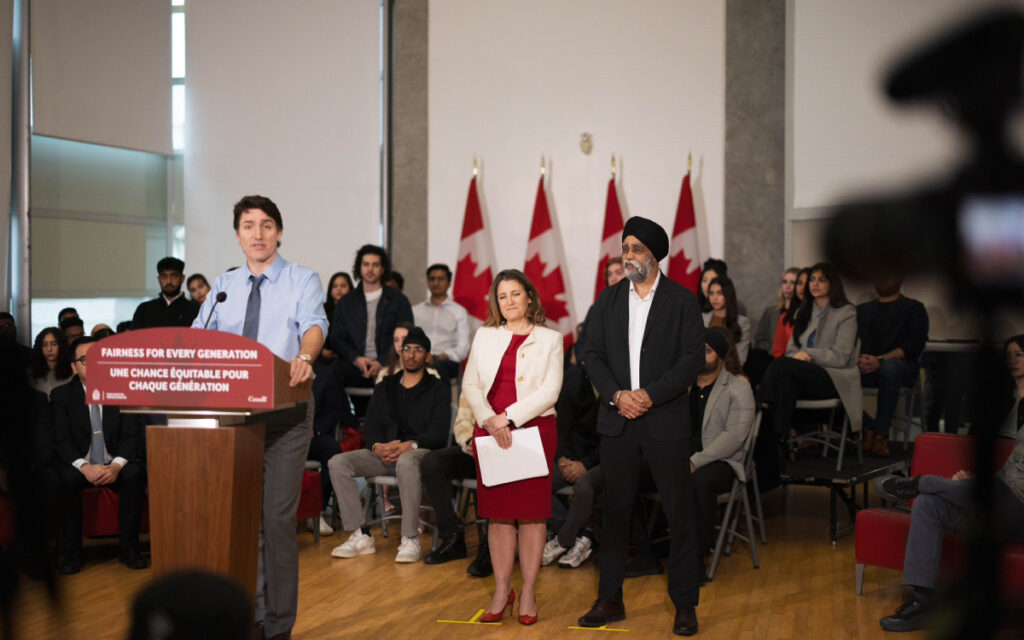
So far, Prime Minister Justin Trudeau has refused to cede ground. On Wednesday, he accused Conservative premiers of misleading Canadians. Pictured: Prime Minister Justin Trudeau, Finance Minister Chrystia Freeland and Minister of Emergency Preparedness Harjit Sajjan. Photo Credit: Harjit Sajjan/X.
The federal carbon tax is dead in the water and there is no Hail Mary pass on the horizon that will save the Trudeau government’s signature policy. Much to the delight of Conservative Leader Pierre Poilievre, the stage is set for a carbon tax election and the ball is firmly in the court of Canadians to choose the outcome.
The carbon tax consensus was years in the making and for a while, most Canadians bought what the Liberals were selling. In the minds of the average voter, a tax was the only path forward for Canada to meet its ambitious emissions reduction targets.
Like most things in life, however, politics requires a bit of skill and a whole lot of luck. As far as winning streaks go, Prime Minister Justin Trudeau had a pretty good thing going.
When Trudeau first came into power, he inherited a balanced budget thanks to the efforts of the previous Conservative government. While oil prices did a nosedive in 2015, the economy was still in relatively good standing and the job market was strong. It is a night and day situation compared to the current fiscal outlook.
These were part of a suite of conditions that set the stage for Trudeau to not only sell his environmental agenda (and tax) but defend it in the 2019 election. Then in the 2021 election, it was Liberal tax versus the Conservative tax. As for the Canadian electorate, they were left with a bunch of complex messages that were difficult to digest.
But for the most part, the hangover from pandemic spending meant that the impact of inflation was still months away.
So here we are today. According to an Abacus Data study conducted last month, climate change remains a top five issue for Canadians. However, it is quickly being outpaced by immigration, which demonstrates a volatile electorate whose primary concerns are focused on domestic issues like cost of living and housing affordability.
Poilievre has also been able to successfully sell the message that Trudeau’s policies are making life more expensive. It’s gone from a toothless exercise in finger pointing from past Conservative leaders to an emotional argument from a leader that is viewed as competent on matters of fiscal importance. Based on Poilievre’s polling numbers, he continues to outpace his Liberal opponent.
It’s also an indication as to why several premiers and provincial Liberal leaders have lined up to distance themselves from the carbon tax and the added blowback expected to come down the pipe come next Monday when costs of essentials like gasoline are expected to increase.
Trudeau has two options on the table. Defend an increasingly unpopular tax at a time when affordability issues are plaguing just about everyone or stay the course and hope for the best.
So far, Trudeau has refused to cede ground. On Wednesday, he accused Conservative premiers of misleading Canadians.
Until members of his own caucus decide to lend their voice to the anti-carbon tax opposition, there is unlikely to be any shift in policy. Trudeau is so confident that Canadians will reject the Conservative vision for Canada that he is laying his cards on the table and refusing to shift gears. Time will tell if the gamble pays off.

Josie Sabatino is a Senior Consultant at Summa Strategies, focused on providing strategic insight and helping clients meet their objectives in an ever changing and complex political and regulatory environment. Prior to joining Summa, Josie spent nearly a decade in political communications and most recently served as the Director of Communications to the Hon. Erin O’Toole, former Leader of the Official Opposition.




















